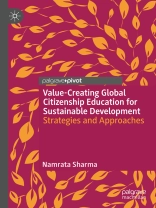This volume brings together marginalized perspectives and communities into the mainstream discourse on education for sustainable development and global citizenship. Building on her earlier work, Sharma uses non-western perspectives to challenge dominant agendas and the underlying Western worldview in the UNESCO led discourse on global citizenship education. Chapters develop the theoretical framework around the three domains of learning within the global citizenship education conceptual dimensions of UNESCO–the cognitive, socio-emotional, and behavioral–and offer practical insights for educators. Value-creating global citizenship education is offered as a pedagogical approach to education for sustainable development and global citizenship in addition to and complementing other approaches mentioned within the recent UNESCO guidelines.
Inhaltsverzeichnis
1. Introduction.- 2. A Sense of Interdependence, Common Humanity, and a Global Outlook.- 3. An Understanding of Peace and Non-Violence as being Central to the Human Rights Agenda.- 4. A Commitment to Reflective, Dialogic, and Transformative Learning.- 5. An Awareness of Climate Change as Planetary Citizens.- 6. A Commitment to Sustainable Development Through Intercultural Perspectives.- 7. A Belief in the Value-Creating Capacity for Social-Self Actualization.- 8. Conclusions – Recommendations for Policy and Practice.
Über den Autor
Namrata Sharma is on the faculty at the State University of New York, USA, and an expert with the United Nations’ Harmony with Nature Knowledge Network. She is also an international education consultant and author of several books, including Value-Creating Global Citizenship Education: Engaging Gandhi, Makiguchi, and Ikeda as Examples (2018).












